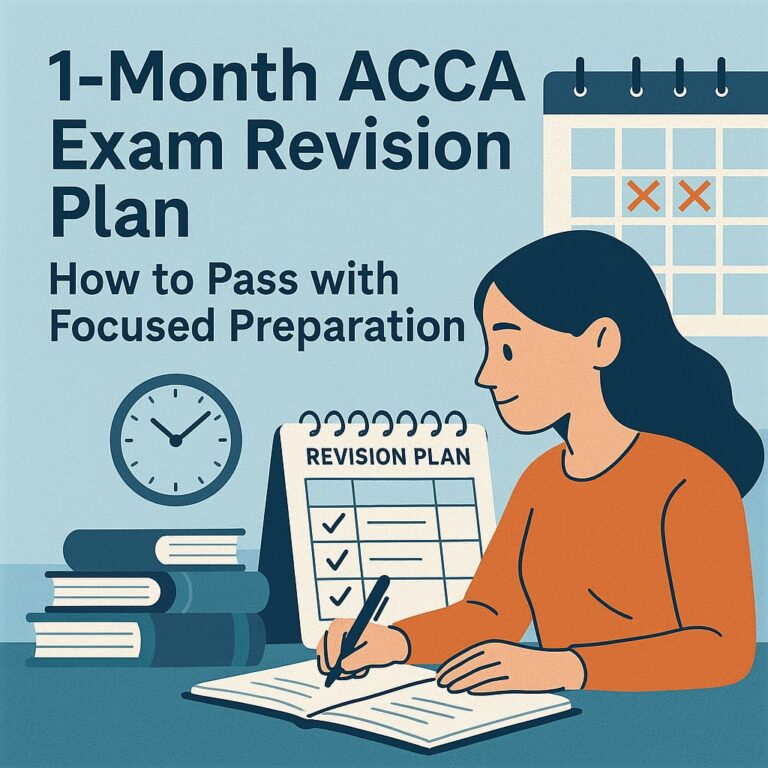Introduction:
Are you an aspirant of ACCA, desperately looking for effective revision plans that could help you prepare for ACCA exams in a short period? Well, that is quite a common issue faced by aspirants nowadays; the ACCA exams are a bit complicated, with a comprehensive syllabus, and ineffective time management contributes to adding fuel to the fire. In this situation, the only thing that can help you out and ease your academic chaos is effective and smart time management. This qualification demands that you stay a bit structured, therefore, revision plans that align with your goals can prove to be a great help for you.
In this blog, we are going to discuss the tips, strategies, and techniques you can use in creating your very own revision plan that can meet all your requirements and help you achieve your goals. ACCA exams aren’t a piece of cake, but with structured plans, effective time or resource management, and determination, one can ace this competitive qualification as well. To know how to make all these things possible and overcome your academic challenges, read the blog ahead.
4-Week ACCA Exams Revision Strategy:
Once you are already prepared for the ACCA exams after practicing or studying all the topics and now you can sense that you are ready to start your revisions. You can create a 4-week exam strategy in which you have to dedicate 5-to 6 hours a day to the revision of a single ACCA course in Malaysia. While revising, make sure to stay focused and utilize reliable resources, such as practicing through past papers or mock exams. This whole practice and effort will help you master the exam technique, reinforce comprehensive knowledge, etc.
Each week, you are supposed to focus on a different revision goal; changing the plan or structure every week can help you stay more attentive and motivated. The weekly breakdown and the changes/alterations you can make in your study plan every week are given as follows:
1. Week One: Foundation and Recap
In the first week of revision, plan focusing on identifying the areas you need to work on, and prioritize the topic with utmost importance and marked weightage. From day one to day four, you need to revise the important topics and spend at least 2-3 hours. After which you can extract important formulas from that topic and update that in a sheet so that you have track of it at the nearest time of ACCA exams; other than that, also create a summary in which you can make bullet points that will help you remember all the essential details on that topic. From day five to day six, you can attempt the questions from the practice papers under exam conditions and cover all the sections or sub-sections (part A or part B of the exams).
After attempting, you can check your answers by comparing them to the examiner’s reports, and then analyze your mistakes. This way, you can assess your progress and what your academic standing is. On the seventh day, take proper mock exams (restricted time and exam conditions implied) and assess your answers thoroughly.
2. Week Two: Application and Practice
ACCA exams are not focused on examining your theoretical knowledge or comprehensive academic learning only, but they also place a great focus on your ability to incorporate that knowledge in real-world scenarios. An aspirant is supposed to identify the financial issue and propose a strategic solution to it with the knowledge they gained from the ACCA qualification.
In week two, you can break your schedule into three timelines: morning, afternoon, and evening. In the morning, begin by revising the key topics and checking the notes/summaries you made last week. In the afternoon, you can attempt practice questions related to the topic you are preparing for. In the evening, compare your answer with the solution proposed in the Examiner’s reports to review your performance.
3. Week Three: ACCA Exams Techniques and Speed
The main focus of this week is on the advanced questions, big case studies, and how to manage time efficiently. This week, make sure you are consistent, no matter how difficult it seems to be; self-examine by solving case studies under timed conditions. If the course includes both subjective and objective questions, mix them both and try to solve them. Aspirants can also utilize the ACCA CBE platform for practicing, especially for ACCA exams at the Applied Skills and the Strategic Professional level. In the middle of the week, you can alter your plan by shifting your focus to the topics you find more challenging or you have previously made mistakes in; you can also discuss your solutions with peers or mentors through online study forums.
When you have reached the end of the week, you should be prepared to take mock exams (all exam conditions applied), You can check it through self-assessment or using ACCA’s marking schemes.
4. Week Four: Final Polishing and Confidence Building
This is the final week for revision of your ACCA exams, hence, you need to speed up your pace and stay confident, and motivated. From day one to day four, you need to do a full review of your academic syllabus with the help of summaries and flashcards, focusing on topics in which you made mistakes previously. Also, now is the time to focus on accuracy; therefore, go for light practice questions, but do not compromise on the accuracy and transparency of the answer. On Day five, you can take a final mock exam to assess and examine your academic standing; this mock should be the same as the real ACCA exams under the same examination conditions and requirements.
Now, consider day six as your ‘rest day’, relax on this day, do not overburden yourself, make yourself mentally relaxed, etc. On the day of the exam, stay calm and focused; pressurizing yourself can enhance the chances of failure.
Conclusion:
As an ACCA aspirant, one thing you should always follow is a structured study and revision plan. A well-structured study schedule and consistency can help you accelerate your academic journey; you can use ACCA practice platforms to increase your productivity and efficiency. If you follow the steps and revision plans religiously, you can easily crack ACCA exams with flying colors.





